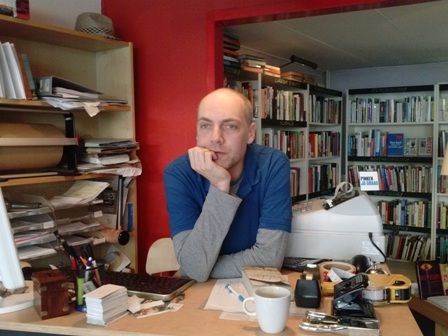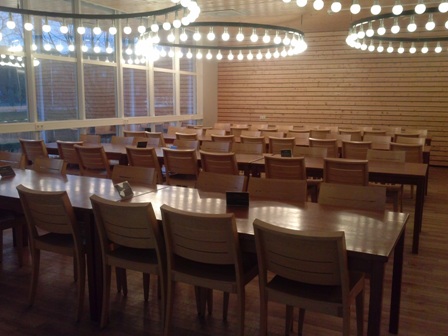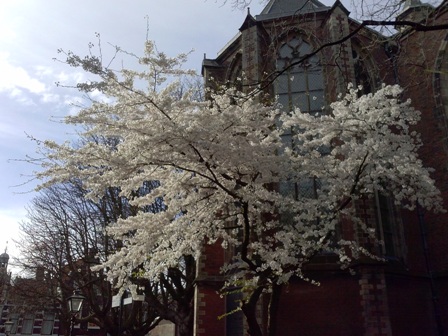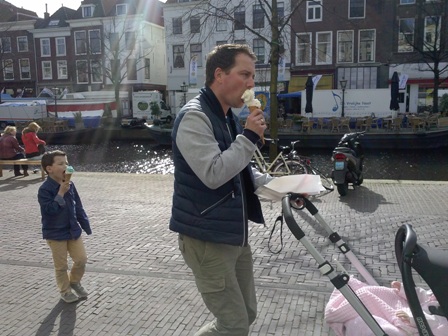“Sport is a hobby”, my friend Sander tells me. He runs a book shop on the Hogewoerd in relatively central Leiden. I make fun of his cultural snobbery and he enjoys belittling my interest in running, football (soccer, Australian rules) or the fight games of boxing or muay thai. Sander is a trained concert pianist who then worked in taxation and who now sells second hand English books and second hand pianos. He’s dishevelled, eats the standard Dutch junk food of sausage rolls and fried potatoes. When I started visiting his bookshop, I often made small talk of the “have you read—-” or “do you recommend—-” kind. On all occasions he came up with blanks. I appreciated his honesty: he wasn’t doing this out of a pleasure for reading “I only read books about Bach”, he said.
This feels like the first day of the season: Richmond vs Carlton from the MCG. This is both a relief and a moment of expectation. The game against the Suns was almost a trial run, an extension of the pre-season competition. The annual defeat to the emerging Suns has been got out of the way. We now have 22 or so rounds to forget about it. The game was played before we were in the mood for footy, before we were willing to be too disappointed in losing. Perhaps it is made somewhat more palatable to happen so early in the season, rather than in the middle when it might disrupt a run of otherwise good form. And anyway, the Suns are ‘much improved’ and ‘will be hard to beat’ so the cliches go. Already, there has been a couple of articles saying that the Suns look up to the Tiges and the trajectory they’ve taken.
▰▰▰▰▰▰▰
The plumber is coming between nine and ten a.m.. I left the apartment at 7:50 so that I could get to campus at 8am and do some work for a couple of hours. I am telling myself, as long as I work on three projects per day, I will stay on top of my schedule. I walk past the old court room and the courtyard where criminals used to be hung for a public performance. Leiden’s university is the oldest in The Netherlands and its law school is famous. I walk past the former house of a famous and infamous scholar of Islam – Snouck Hourgranje. An Islamologist and Acehnese specialist who played a key role in the Dutch defeat of the Acehnese resistance. As a Dutchman who has recently relocated to Jakarta told me, “he entered Islam to destroy Islam”. Scholarship is indeed problematic; research isn’t undertaken in some kind of vacuum.
I arrive at the campus dining room and turn on my computer: my worry is not that I have enough work to do. My worry is that I’m spreading myself too thin across a variety of projects. I’m moving from literature to Islam to sport. I feel this is both a luxury and a problem. Perhaps this is the fate of a freelance and rather unemployed academic, researcher, writer, translator. I am making my own work and investing in new projects which may lead me where the study of literature hasn’t. I have a new collection of short stories to translate. These are by an author whose work I have hardly read. But he is a part of the canon and this is an opportunity for me to get to know his writings. The project, I estimate, will take three months. I’ll write an essay and get a publication. Necessary steps. I have manuscript to finish. A book proposal is in the offing. Some of these projects will work out, perhaps others will lead nowhere.
My Dell laptop is the vehicle for streaming the live footy. This laptop has probably seen as much footy as it has work – literary studies, urban studies, Islamic studies. And now, so that I can reconcile my recreation with my professional interests, sports studies. The keyboard needs to be cleaned. When the sun shines in brightly, and it does, even here in The Netherlands, I see the grime of the screen. This Dell laptop has seen a few countries and quite a few cities. It has its idiosyncrasies: occasionally I can connect to one website, but not another. My technical knowledge doesn’t exist beyond re-starting the damn thing. Most of the time this works. I get my work done: this time it is a few more translated paragraphs of a short story by Budi Darma and some notes made on a book about football (sepakbola in Indonesia). A couple of hours later, I leave campus and start walking home, eating my apple, while others are arriving in a hurry on their bicycles (and eating their apples or sandwiches) to get to their lectures or attend meetings. Most are dressed smart casually; no suits. There are no traffic jams and the footpaths merge seamlessly into the roads. Who has right of way is a lot to do with body language and indifference.
▰▰▰▰▰▰▰
I turn on the game as the teams break from their quarter time huddle. I see a comfortable margin for the Tiges. But, there’s three quarters to go; as usual the game could go in any direction. There is plenty of time for the game to turn and plenty of time for the Tiges to dish out a beating to the Blues. Indeed, it is too easy to get ahead of oneself while watching the game and start predicting and fearing what might happen. I’ll always remember those dying moments of Brisbane vs Geelong – perhaps June 2013. That was the sublime of footy. It was a moment of beauty for neutrals and Brisbane fans, a moment of horror for Geelong fans, players. The Lions – who ingloriously sacked their coach at the end of their season – moved the ball from the back-line to the half-forward line with a mixture of precision, improvisation and brilliance. And the irony was a Geelong supporting commentator was in the unfortunate position of cheering the ball home as it sailed through the goals. Brisbane had invented a new way to win. Geelong had invented a new way to lose. This time it wasn’t my club doing the ignominious losing.
▰▰▰▰▰▰▰
As a matter of course, it is all square in the last quarter. The plumber has been and gone. He trudged up the stairs and straight into the bathroom – not caring to inquire about how the Tiges were going. He left during half-time; job done and not interested in hanging about for the second half. I remember the corresponding game last year. I turned it off as I couldn’t stand the tension. It was a delayed telecast on Australia Network and I immediately went to my Dell to check the score on the Tiges’ website. How disappointing to see the Tiges had won: I was shown up as being of little faith. But, perhaps this was an act born of separation and of geographical distance. This year, I wouldn’t succumb: I’d see it to the end and hold my nerve. I wander about my living room – hanging up the washing, sweeping the floor, all the while Dennis and Bruce are getting excited – making dire predictions and inflating the heroics of each player (I prefer Gerard Whateley’s straight talking and slight down-playing amongst the general hubbub and hullabaloo).
Sport – for its many production of rules, it’s highly circumscribed tensions and oppositions – is inseparable from a sense of what could be and what might have been. I’m not at the game and watching it live on a Dell laptop won’t replace it at any moment. One watches at many levels: a fan of the game, a fan of a team, a fan of a player, a believer in the importance of understanding what makes the game of footy essential to an understanding of place and identity. Watching Australian football while in learned, scholarly Leiden, is an act of parochialism and nostalgia. It offers a mediated sense of following the trajectory of the Tiges and their own vulnerable, quixotic journey – one way or another – to a flag.
▰▰▰▰▰▰▰
The Tiges have won and once again I’m at Sander’s bookshop. This time I’m exchanging some of the earlier books I bought from his shop for new ones. We’ve established a rapport and he trusts me to return the books I have read. It’s his pianos that make most of the money for his shop – which he runs with the occasional assistance of his parents and a young, and similarly anti-sport, linguistics graduate. I tell him that he needs a sport section. He tells me that the people who visit his shop aren’t interested in sport. I tell him that he already has potentially dozens of books on sport on his shelves. I see Nick Hornby’s Fever Pitch, Don DeLillo’s Underworld, Allan Sillitoe’s The Loneliness of the Long Distance Runner, Richard Ford’s The Sportswriter, Lionel Shriver’s Double Fault and Lynne Truss’s Get Her Off the Pitch! These are only the novels I see that are in one way another invoke sport or play. Without his knowing it, his bookshop slowly, but surely acts as a subtle vehicle for an understanding of sport beyond hobby.




Gerard has continued the tradition of Tim Lane, Peter Booth and Neville Oliver, good, calm and accurate calling. You sense that they are aware of a world outside football, indeed outside sport.
Gerard does sometimes flip the switch to Churchill, when he thinks the moment calls for something that will work well in the highlights package.
As a child my father would take my brother and I to the art galleries of suburban Richmond, Prahran and Collingwood before going to the footy. I remember seeing the paintings of Peter Booth at Pinacotheca on Waltham Place and then later hearing the commentary of Peter Booth. I couldn’t reconcile the two Peter Booths; but art and footy became inseparable.
That’s terrific – I’m aware of the painter but have never made the connection. I love to imagine Smooth signing off at the end of a nailbiter from Vic Park, and then going home, getting out the palette knives and really piling on some impasto like a brute.